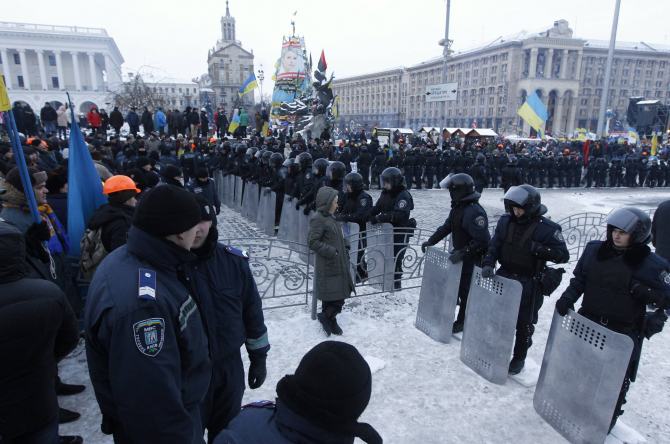1. How dramatic is the situation in Ukraine? More and more commentators claim that the country is on the verge of civil war.
Yes, it is. However, the confrontation is not between e.g. regions, but between governmental structures, mostly security structures (police/law enforcement) and groups of society. I suppose it is similar to some extent to the situation in Poland on the eve of General Jaruzelski imposing martial law that Solidarity successfully defied in the long term.
2. How can you describe the leadership of Euromajdan and the opposition movement? Is it possible for them to take control over the situation?
There is no such leadership; it is in the process of being formed. Until 19th January, the three leaders of the established opposition had assumed this role somehow: Arseniy Yatsenyuk of Fatherland, Vitaliy Klitschko of UDAR and Oleh Tyanibok of the so-called Svoboda-Party – the opposition parties represented in the national parliament. Nowadays, they are only tolerated and many protesters understand them as a kind of negotiating body that reports back to them and has to get their approval. At the very beginning, there was a Maidan of civil society on Maidan Nesaleshnosti and a Maidan of the established opposition on European Square in Kyiv. They united after the disturbances of 30th November.
3. What should be the suggestion for Europe? How can we help Ukraine in its struggle for freedom, democracy and human rights?
There is a lack of trust which has to do with the deeply flawed political culture. This is where respected international mediators could step in. Also, they might be in a position to guarantee President Yanukovych and his entourage personal immunity in the event of his resignation – which has to be considered against the background that many lives may be in danger in case the revolt turns into a civil war. A Round Table format as in Poland, later followed by the break-down period of the GDR, could somehow initiate a process that allows for a way out of today’s standoff.
4. How can you assess the role of Vladimir Putin and Russia’s influence on this situation?
The Kremlin’s influence has always been a reality. It is naive to negate it.
5. Are oligarchs still supporting Viktor Janukowicz?
It varies. I believe neither a split of the country, nor further escalation of force or a civil war is in their interest. They might be effective mediators as well.
6. Do you think that the danger of splitting the country into West and East sides is real?
Yes, but it is not inevitable.
7. When can we expect the new elections?
This will depend on internal and external conflict management skills. Stefan Füle is coming to Kyiv again tomorrow. And there’s the EU-Russia-Summit going on.



















No comments
Be the first one to leave a comment.